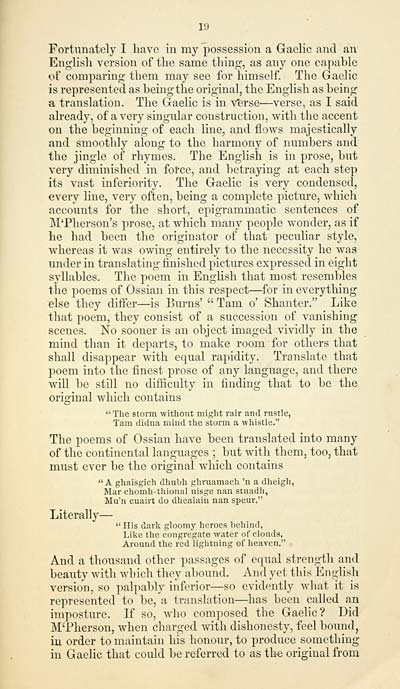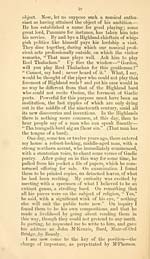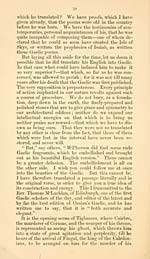Download files
Complete book:
Individual page:
Thumbnail gallery: Grid view | List view

19
Fortunately I have in my possession a Gaelic and an
English version of the same thing, as any one capable
of comparing them may sec for himself. The Gaelic
is represented as being the original, the English as being
a translation. The Gaelic is in v'erse — verse, as I said
already, of a very singular construction, with the accent
on the beginning of each line, and flows majestically
and smoothly along to the harmony of numbers and
the jingle of rhymes. The English is in prose, but
very diminished in fol^ce, and betraying at each step
its vast inferiority. The Gaelic is very condensed,
every line, very often, being a complete picture, which
accounts for the short, epigrammatic sentences of
M'Pherson's prose, at which many people wonder, as if
he had been the originator of that peculiar style,
whereas it was owing entirely to the necessity he was
under in translating finished pictures expressed in eight
syllables. The poem in English that most resembles
the poems of Ossian in this respect — for in everything
else they differ — is Burns' " Tam o' Shanter." Like
that poem, they consist of a succession of vanishing
scenes. No sooner is an object imaged vividly in the
mind than it departs, to make room for others that
shall disappear with equal rapidity. Translate that
poem into the finest prose of any language, and there
will be still no difficulty in finding that to be the
original which contains
"The storm without might rair and rustle,
Tam didna mind the storm a whistle."
The poems of Ossian have been translated into many
of the continental languages ; but with them, too, that
must ever be the original which contains
" A ghaisgich dhubh ghruamach 'n a dheigli,
Mar chomh-thional uisge nan stuadh,
Mu'n cuairt do dhealain nan speur,"
Literally —
" His dark gloomy heroes behind,
Like the congregate water of clouds,
Around the red lightning of heaven."
And a thousand other passages of equal strength and
beauty with which they abound. And yet this English
version, so palpably inferior — so evidently what it is
represented to be, a translation — has been called an
imposture. If so, who composed the Gaelic? Did
M'Fherson, when charged with dishonesty, feel bound,
iu order to maintain his honour, to produce something
in Gaelic that could be referred to as the original from
Fortunately I have in my possession a Gaelic and an
English version of the same thing, as any one capable
of comparing them may sec for himself. The Gaelic
is represented as being the original, the English as being
a translation. The Gaelic is in v'erse — verse, as I said
already, of a very singular construction, with the accent
on the beginning of each line, and flows majestically
and smoothly along to the harmony of numbers and
the jingle of rhymes. The English is in prose, but
very diminished in fol^ce, and betraying at each step
its vast inferiority. The Gaelic is very condensed,
every line, very often, being a complete picture, which
accounts for the short, epigrammatic sentences of
M'Pherson's prose, at which many people wonder, as if
he had been the originator of that peculiar style,
whereas it was owing entirely to the necessity he was
under in translating finished pictures expressed in eight
syllables. The poem in English that most resembles
the poems of Ossian in this respect — for in everything
else they differ — is Burns' " Tam o' Shanter." Like
that poem, they consist of a succession of vanishing
scenes. No sooner is an object imaged vividly in the
mind than it departs, to make room for others that
shall disappear with equal rapidity. Translate that
poem into the finest prose of any language, and there
will be still no difficulty in finding that to be the
original which contains
"The storm without might rair and rustle,
Tam didna mind the storm a whistle."
The poems of Ossian have been translated into many
of the continental languages ; but with them, too, that
must ever be the original which contains
" A ghaisgich dhubh ghruamach 'n a dheigli,
Mar chomh-thional uisge nan stuadh,
Mu'n cuairt do dhealain nan speur,"
Literally —
" His dark gloomy heroes behind,
Like the congregate water of clouds,
Around the red lightning of heaven."
And a thousand other passages of equal strength and
beauty with which they abound. And yet this English
version, so palpably inferior — so evidently what it is
represented to be, a translation — has been called an
imposture. If so, who composed the Gaelic? Did
M'Fherson, when charged with dishonesty, feel bound,
iu order to maintain his honour, to produce something
in Gaelic that could be referred to as the original from
Set display mode to: Large image | Transcription
Images and transcriptions on this page, including medium image downloads, may be used under the Creative Commons Attribution 4.0 International Licence unless otherwise stated. ![]()
| Early Gaelic Book Collections > Ossian Collection > Authenticity of the poems of Ossian > (21) |
|---|
| Permanent URL | https://digital.nls.uk/78396642 |
|---|
| Description | Selected books from the Ossian Collection of 327 volumes, originally assembled by J. Norman Methven of Perth. Different editions and translations of James MacPherson's epic poem 'Ossian', some with a map of the 'Kingdom of Connor'. Also secondary material relating to Ossianic poetry and the Ossian controversy. |
|---|
| Description | Selected items from five 'Special and Named Printed Collections'. Includes books in Gaelic and other Celtic languages, works about the Gaels, their languages, literature, culture and history. |
|---|

